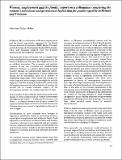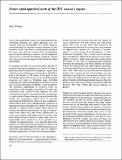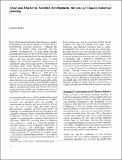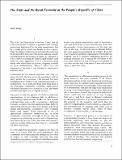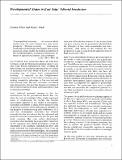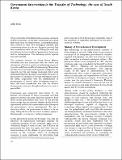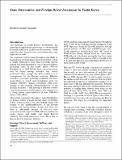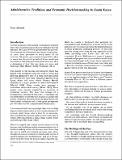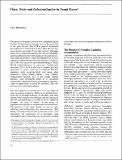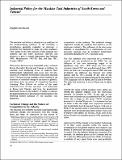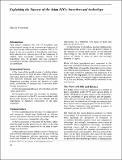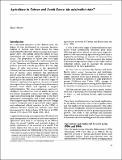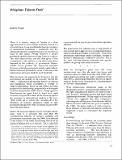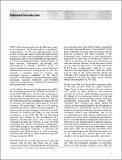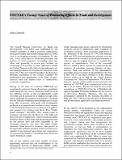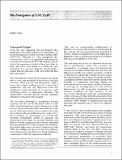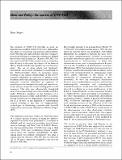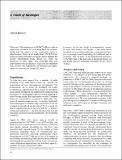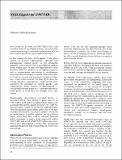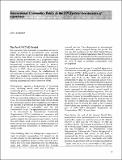1980 - 1989: Recent submissions
Now showing items 181-200 of 430
-
Women, employment and the family: report on a colloquium comparing the women's movement and government legislation for gender equality in Britain and Vietnam
(Institute of Development Studies, 01/01/1984)SUMMARY This is an account of a colioquium on Women, employment and the family held in Hanoi, March 14?24, 1983 jointly organised by the Subordination of Women cluster IDS, and the Vietnamese Social Sciences Research ... -
Future rapid appraisal work of the IDS women's cluster
(Institute of Development Studies, 01/01/1984) -
State and Market in Socialist Development: the case of Chinese industrial planning
(Institute of Development Studies, 01/04/1984)SUMMARY This article examines the capacities and limits of the socialist state as an instrument of industrialisation in China. Chinese experience suggests that state involvement at all stages of socialist industrialisation ... -
The State and the Rural Economy in the People's Republic of China
(Institute of Development Studies, 01/04/1984)SUMMARY Chinese rural policy, assisted by Mao Zedong's critique of Stalinism, has moved away from the policy of ‘squeeze’, from uncritical assumptions about economies of scale in farming, and from insistence on the necessity ... -
Developmental States in East Asia:Editorial Introduction
(Institute of Development Studies, 01/04/1984) -
Government Intervention in the Transfer of Technology: the case of South Korea
(Institute of Development Studies, 01/04/1984)SUMMARY The development of South Korea's petrochemical industry has relied heavily on foreign technology. The remarkable success of the industry in a short period of time is mainly due to persistent government intervention ... -
State Intervention and Foreign Direct Investment in South Korea
(Institute of Development Studies, 01/04/1984)SUMMARY Radical claims that foreign direct investment has ‘denationalised’ the South Korean economy are unfounded; and neoclassical claims that Korean policy towards direct foreign investment has been unusually liberal ... -
Administrative Traditions and Economie Decision?making in South Korea
(Institute of Development Studies, 01/04/1984)SUMMARY This article offers a preliminary analysis of what is often considered a formal hierarchy, suggesting that decisionmaking in the Korean Government is far from being a simple case of orders and policies descending ... -
Class, State and Industrialisation in South Korea
(Institute of Development Studies, 01/04/1984)SUMMARY An explanation of how private industrial capital became the driving force of society is central to an understanding of South Korean industrialisation. This process had two main phases: the transformation of landed ... -
Industrial Policy for the Machine Tool Industries of South Korea and Taiwan
(Institute of Development Studies, 01/04/1984)SUMMARY The Korean machine tool industry began to develop later than the Taiwanese, but has now overtaken it in several respects, and more aggressive state help is one of the reasons why. State intervention will have to ... -
Explaining the Success of the Asian NICs: incentives and technology
(Institute of Development Studies, 01/04/1984)SUMMARY This article sets out the essential links in the neoclassical interpretation of Asian NIC performance, as exemplified in the work of Little and Balassa. It considers some theoretical weaknesses in the neoclassical ... -
Agriculture in Taiwan and South Korea: the minimalist state?
(Institute of Development Studies, 01/04/1984)SUMMARY The state has intervened heavily in the agricultural economies of Taiwan and South Korea, both by direct administrative means and by establishing price relativities very different from those set by market forces. ... -
Dirigisme Taiwan?Style
(Institute of Development Studies, 01/04/1984)SUMMARY The Government of Taiwan has pursued a much more aggressive set of industrial policies than free trade principles would justify. It has been anticipating rather than simply responding to Taiwan's changing international ... -
Editorial Introduction
(Institute of Development Studies, 01/07/1984) -
UNCTAD's Twenty Years of Pioneering Efforts in Trade and Development
(Institute of Development Studies, 01/07/1984)SUMMARY UNCTAD is the principal instrument of the General Assembly of the United Nations for deliberation and negotiation in the field of international trade and related issues of international economic cooperation. ... -
The Emergence of UNCTAD
(Institute of Development Studies, 01/07/1984)SUMMARY At the level of international diplomacy the most important factor in the convening of UNCTAD I in 1964 was the progressively deteriorating situation of developing countries in world trade in the course of the 1950s ... -
Ideas and Policy: the sources of UNCTAD
(Institute of Development Studies, 01/07/1984)SUMMARY The Singer?Prebisch thesis that there is an inherent bias in international trade against the interests of developing countries was the intellectual mainspring for the foundation of UNCTAD. The setting up of an ... -
A Clash of Ideologies
(Institute of Development Studies, 01/07/1984)SUMMARY UNCTAD has some real achievements to its credit in two interrelated fields. It has initiated new ideas, new concepts and new approaches to the problems of trade and development and it has negotiated international ... -
NGO Support for UNCTAD
(Institute of Development Studies, 01/07/1984)SUMMARY Among their other activities, NGOs lobby the negotiating governments of member states of UNCTAD. They have on occasion been able to bring the parties closer together, not least by promoting an exchange of information ... -
International Commodity Policy in the UN System: two decades of experience
(Institute of Development Studies, 01/07/1984)SUMMARY The slow progress in the implementation of UNCTAD's Integrated Programme for Commodities (IPC) since its establishment in 1976 has given rise to doubts about the merits of international commodity policy, especially ...

